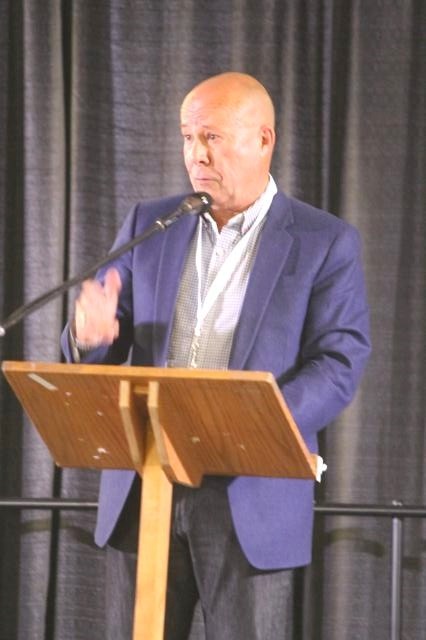The federal government is trying to appease two opposing points of view and will end up hurting this province by imposing a carbon tax on Saskatchewan, while at the same time trying to pretend to support the oil industry by supporting pipeline projects, attendees to the Saskatchewan Oil and Gas Show were told by radio host and author John Gormley.
The host spoke at the industry luncheon on June 9, as he has for the past few Oil Shows, and broadcast his daily morning talk show live from Crescent Point Place, featuring local dignitaries including Mayor Marcel Roy, MLA and Energy Minister Dustin Duncan, and Del Mondor, chair of the Oil Show.
In addressing the issue of the carbon tax to be imposed by the federal government, Gormley suggested the tax “is reflective of a much deeper issue that will play out over the next few years.”
He said that Prime Minister Justin Trudeau is playing both sides of the issue, as on one hand he is seen supporting the industry by approving the Enbridge pipeline and the Kinder Morgan pipeline, while encouraging the opposition to the Northern Gateway pipeline in B.C.
Alberta Premier Rachel Notley has found out that she cannot play both sides, as she once called the tarsands projects in Fort McMurray “dirty oil”. “She realized that you can’t oppose oil production and govern in Alberta at the same time,” said Gormley, explaining that those who oppose oil production can never be appeased as they are always moving the goalposts.
Gormley was also critical of the term “social licence” used by environmentalists who oppose the ongoing production of oil and gas. “Social licence is a completely made-up foreign construct,” he said, noting that environmentalists say only the community can grant an industry permission to operate.
“If that were true, it would be awkward enough, because how would you ever get the permission of the community?” he asked.
Meantime, the oil industry in the southeast area is showing signs of resuming some activity, as Gormley noted that many of the guests he talked to spoke of a common problem, namely a shortage of workers in the industry. “We’re feeling it here and all across the oilpatch. … It’s challenging a lot of companies in the oilpatch,” he said, noting many smaller oil companies are finding it difficult to recapitalize after the downturn of the previous few years.
Gormley noted he never hears the industry ask the government for anything or go to them with their hand held out, only that they would like to be left alone more.
Speaking of what he sees ahead for Saskatchewan, Gormley said there may one day be no more need for oil to be produced, but he suspects no one living today will see that day come.
He pointed out the world as a whole consumes 96 million barrels of oil every day, and the forecast is for that level to hit 100 million barrels in the next four years. “If you need and want oil that is still safe and reliable, they will do no better than Canada, and part of that is what you do from Midale to the Bakken and beyond,” said Gormley.
He pointed out a strength of Saskatchewan is that immigration numbers are the strongest for this province since the 1920s, and the factors of change range from immigration and cheaper air fare to the Internet and social media, and the 500-channel universe.
All of these have combined to radically change the world as we know it today, he said, and have changed Saskatchewan from being a “doughnut-hole” province where the demographics used to be the population was comprised of the very young and the very old with very few of the age groups in between. Today that doughnut hole has been filled in demographically, and this will lead to new opportunities in Saskatchewan, and for the oil industry looking forward, he said.



